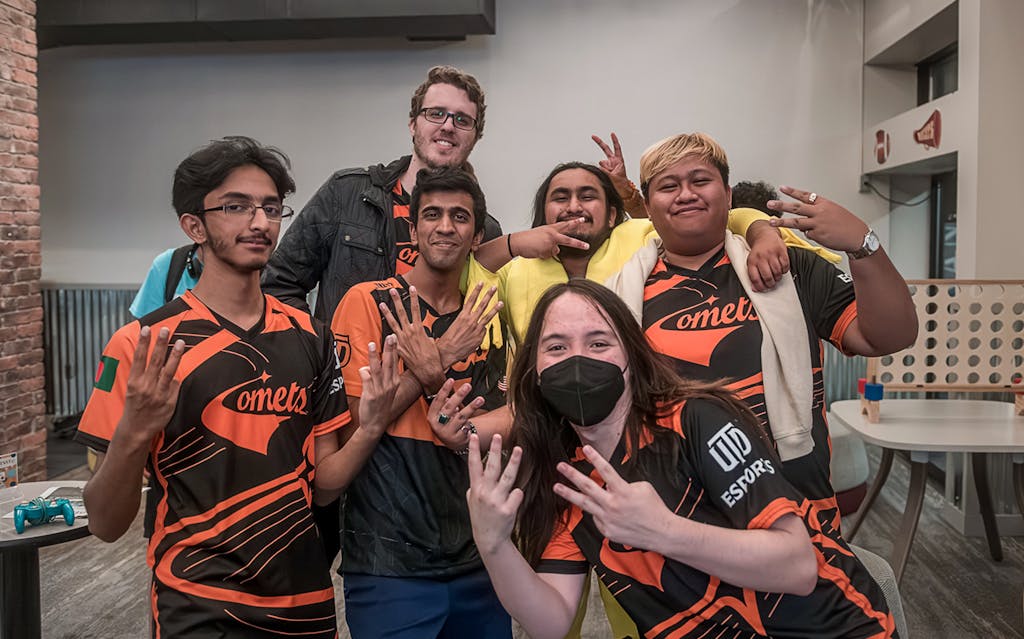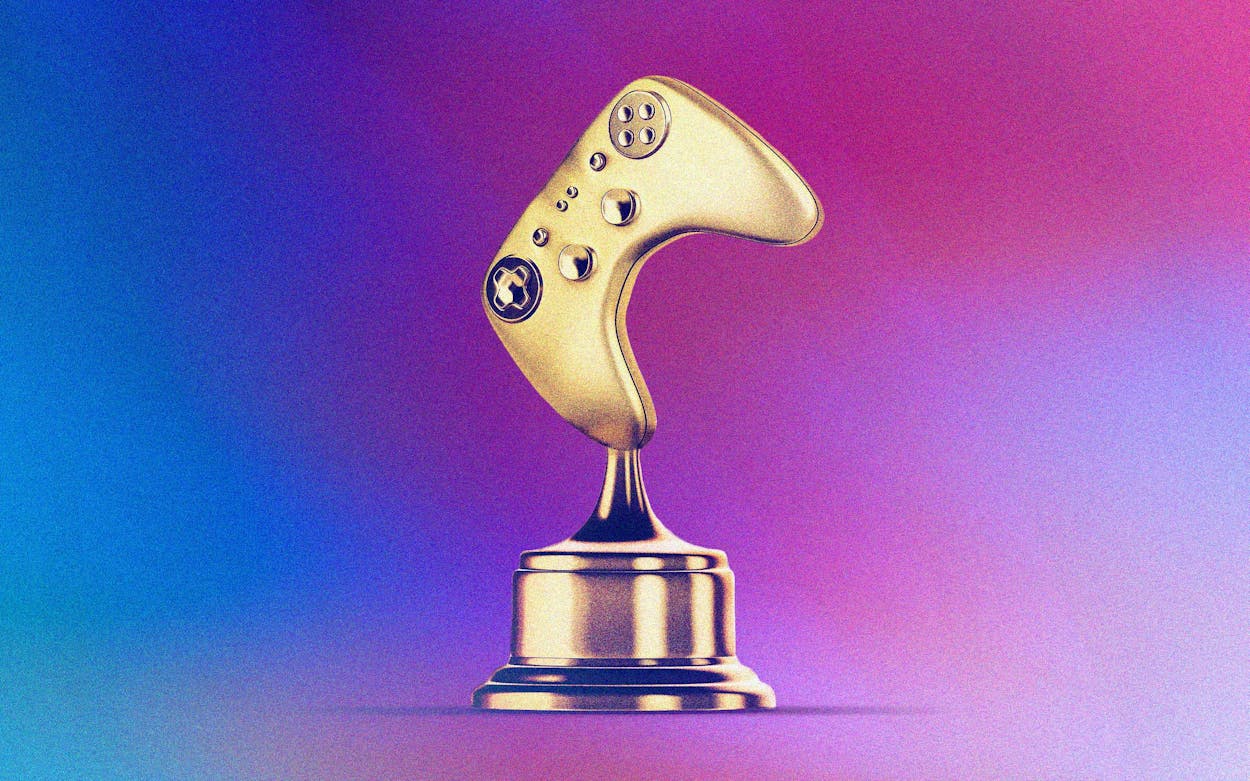“Dude!”
A. G. Pai didn’t realize at first that one of his classmates at the University of Texas at Dallas was talking to him.
“Good job winning the Texas state championship.”
“I’m like, ‘You knew about that?’ ” Pai said. “They were watching the stream. Nice.”
Championship-level college sports teams across the state are typically well-known, competing before thousands of fans in person and regularly seen on national television. Not so for the UTD Comets teams that compete in various video games.
The stream that Pai mentioned was a digital broadcast of UTD’s October victory in the Texas collegiate Super Smash Bros. championship, held at Texas State University. The Comets entered as the number two seed, beat number one Texas A&M in an early round, and then topped the Aggies again in the tournament final. On the nearly four-hour drive home from San Marcos, coach Drew Boehm pulled over the team van for a victory dinner of chicken tenders and crinkle-cut fries at Raising Cane’s. “Some of them even got the six-piece,” Boehm said.
That same weekend, UTD’s Overwatch team finished in the top sixteen of a national competition that attracted more than two hundred entrants. “Making top sixteen in that Overwatch tournament is a huge achievement,” said Boehm, who has been UTD’s full-time e-sports coach since January 2022. “It’s the equivalent of March Madness.”
The Comets’ recent performances should further solidify UTD’s claim to the title of Texas’s top college e-sports program. Earlier this year, BestColleges ranked UTD tenth in its annual ranking of schools with the best e-sports programs. No other Texas college appeared on the list.
All this from a school of 31,000 students in Richardson, about twenty miles north of Dallas, that competes in nonscholarship NCAA Division III athletics and doesn’t field a football team. “We could be the football program at UTD,” Boehm said. “Football’s often the biggest and most popular thing. E-sports definitely has the chance to be that here.”
Unlikely? Well, UTD is in many ways an outlier among Texas colleges. The founders of nearby Texas Instruments opened the school in 1961 (it joined the UT system in 1969) to create a training ground for future employees. UTD started as a graduate school, then began admitting upper-level undergrads in 1975 before finally welcoming its first freshman class in 1990. The campus resembles a modern office park.
“We’re a STEM-focused school,” said Gene Fitch Jr., vice president for student affairs. “If you talk to our president, he would go so far as to say a STEAMM school, with the A being arts and the other M being management. In 2018, we had to convince some folks that [an e-sports program] was right for us. But now that we’ve done it over the last five years, we’ve seen the popularity grow.”
Boehm estimated there are a dozen or so Texas colleges with varsity e-sports programs; it can be difficult to determine, he said, because some schools have club teams that compete on even terms with varsity teams.

UTD’s e-sports varsity typically consists of thirty to forty students competing in five games: Smash Bros., Overwatch, League of Legends, Rocket League, and Valorant. Some members of the program specialize in fighting games, like Smash Bros., while others excel in first-person shooters, like Overwatch. In competitive settings, they don’t overlap.
“It’s almost like asking somebody who does tae kwon do to go and skeet shoot,” said Noureen Hoq, a neuroscience master’s student who serves as the Comets’ Overwatch manager. “All games are completely different; different ways of thinking, different things to pay attention to.”
Starting lineups, usually four or five to a team, are often determined before a semester begins and rarely change during the course of play. And play consists of dozens of competitions throughout the season, most of them held virtually, with competitors logging on from schools across the state and beyond.
Competitions can last anywhere from two to four hours, depending on the game. Varsity members are expected to practice two to four times weekly and also participate in scrimmages. “We’re kind of the night owl group,” Boehm said. “It’s almost impossible to find a ‘scrim’ before five [p.m.].”
Some virtual matches find UTD players competing from the team’s room in the student union building; some find them playing from a team member’s apartment or dorm room. Said Boehm: “If we have a match at eleven [p.m.], we don’t want players going home at one [a.m.].”
Boehm provides little in terms of game strategy to his players. As coach, he’s more of an organizer. A 2017 TCU grad with a degree in criminal justice, Boehm left college with the goal of becoming an FBI, CIA, or DEA agent. He had participated in e-sports at TCU, and that led to his change in career paths. Boehm coached e-sports at the University of St. Mary, in Kansas, and UT-Arlington before UTD.
The school has granted e-sports scholarships to some students, usually no more than $500 per semester. UTD also recently spent $11 million to expand its e-sports space on campus. From a second-floor area in the student union comparable in size to a small lecture room, Boehm’s program will soon move into a two-story, 15,000-square-foot complex called Comets LANding. The new facility will include a spectator area that, although modest in size, will be a rare mark of status for a collegiate e-sports program.
Construction is scheduled to begin over the winter, and UTD’s commitment to e-sports—especially the Comets LANding complex—was Boehm’s primary reason for accepting the coaching gig. “It’s a game changer,” he said. “We’ll start selling merchandise.”
Fitch said the program helps boost enrollment at UTD. “The technology piece, the gaming piece is already built in because of the programs we offer in video and games design,” Fitch said. “So, this is just a natural fit for us.”
Dan Goodwin, who oversees e-sports as UTD’s director of student life programs, said the program reflects the differences between today’s college students and those of previous generations. “Ways that we would historically engage students look a little different now,” he said. “And a lot of students enrolling in college are into e-sports and maybe not as much traditional sports or traditional avenues of socialization.”
With the new Comets LANding facility, the school hopes not only to provide e-sports with better facilities but also to create a gathering place for UTD’s recreational gamers to play alongside their classmates. “If you’re going to game,” Fitch said, “don’t sit in your room or your apartment and do that alone.”
Pai, a senior business administration major, had been a member of his high school e-sports club before joining UTD’s varsity program. He said he’s been gaming since he was four, when he and his mother played together on a Game Boy. “My mom is really supportive about what I do because she knows this makes me happy,” he said. “As long as my grades are okay, [my parents] are fine with it.”
One of Pai’s Smash Bros. teammates is computer engineering major Varun Siva. “I like how it’s very positional,” Siva said of the game, “where you have to rely more on your movement.”
Computer science major Daniel Kadosh competes with the Comets’ Overwatch team, which followed its October success with a fourth-place finish in a competition at the University of Kentucky that attracted most of the country’s best teams. “I really like the team play,” said Kadosh. “Other games you kind of play for yourself. In Overwatch, you need to trust your team to win.”
Kadosh said mental conditioning is important for players. “You have to be in the right place mentally to play well,” he said. “I think most of us work out, but I don’t think that contributes to us playing better.”
Boehm believes many of his varsity players are competing at the level of professional gamers. He said their ability is “in the top one percent skill bracket.”
Hoq said she hopes recognition of the program reaches the point at which fellow students realize: “Oh, they’re actually doing something kind of profound here.”
Perhaps. Or maybe it’ll be enough for students, once UTD’s new gaming center opens, to crowd the seating area at Comets LANding and belt out the last bars of the school fight song while the e-sports team competes in a major tournament.
“Fight ’em, Comets! Burn ’em, Comets! Crush ’em, Comets!
“Whoosh! . . . C-O-M-E-T-S!”
They might not have a football team, but they can make Comets LANding sound like a slice of Kyle Field.
- More About:
- Sports
- Richardson
- Dallas






